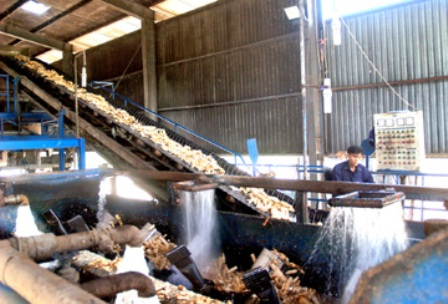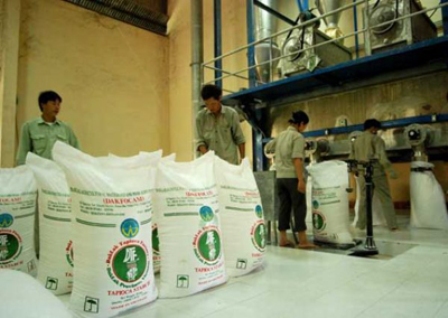


|
About SNV
SNV is an international development organisation with headquarters in the Netherlands and staff in 35 different countries. For over 40 years, we have provided advisory services to national, regional and local governments, entrepreneurs and citizen associations to alleviate poverty. With over 900 technical advisors and 100 local teams around the world, we provide expertise in agricultural and forestry products, renewable energy, water and sanitation, governance and private sector development.
SNV builds strong networks across Asia by maintaining both national and district offices in Nepal, Bhutan, Lao PDR, Vietnam and Cambodia. We directly engage with key local organisations in diverse geographical settings, ranging from remote mountain provinces, to lower-lying and faster developing districts. For more information, please visit our website: www.snvworld.org,
About Inclusive Business
Inclusive businesses find profitable ways to engage the low-income segment into their business operations in a way that benefits the low-income communities and creates sustainable livelihoods. For more information, please visit our Inclusive Business website: www.inclusivebusiness.org.vn,
|
On August 16, Vietnam Business Council for Sustainable Development (VBCSD) convened a general meeting to introduce to the business community and related organizations the Executive Board, action plan and report on the past period and the Council in general. VBCSD Executive Board also reported to Deputy Prime Minister Nguyen Thien Nhan, Chairman of National Council for Sustainable Development, and role of business community on the implementation of the orientation for sustainable development strategy in Vietnam. Vietnam Business Forum interviewed Ph.D Doan Duy Khuong, VCCI Vice-President and VBCSD Co-chair on the issue. Dang Yen reports.
Human resources play a crucial role in sustainable development in all areas, especially the business sector. Vietnam Business Forum interviews Mr Louis Taylor, General Director, Standard Chartered Bank (Vietnam) Limited, one of the Executive Board members of Vietnam Business Council for Sustainable Development (VBCSD),
DNV (Det Norske Veritas) - a VBCSD member - is a global provider of knowledge for managing risk. Our purpose is to safeguard life, property and the environment. Our core competence is to identify, assess, and advise on risk management, and so turn risks into rewards for our customers. From our leading position in certification, classification, verification, and training, we develop and apply standards and best practices. This helps our customers to safely and responsibly improve their business performance.
At the meeting, Dr. Vu Tien Loc, Chairman and President of Vietnam Chamber of Commerce and Industry (VCCI) stated that “Thanks to the General Meeting, VBCSD’s members will further understand its activities so that they have more active and efficient involvement. Besides, the event is also a chance for other delegates to discover long-term coordination or partnership with VBCSD after they better understand its detailed workplan and strategic plan”.
VGP – Deputy Prime Minister Nguyễn Thiện Nhân today in Hà Nội hosted a reception for Mr. Gary Schutz, Co-Chairman of the Việt Nam Business Council for Sustainable Development (VBCSD). Deputy Prime Minister said he hoped the Council would realize its action plan on four top priorities including energy, climate change, education, and environment protection by the year end.
On July 22, the Vietnam Business Council for Sustainable Development (VBCSD) held a workshop entitled " Business and Sustainable Development " with the aim of raising the understanding of business roles in sustainable development for business leaders, PR managers, sustainable development managers, and communication managers from VBCSD member companies.
Tata Steel is, perhaps one among very few companies in the world, to be blessed with these values at the very moment that it was conceived by Jamsetji Tata, the Founder of the Tata Group in the late 19th Century. A true nationalist, he strongly advocated the development of indigenous industry in India, while at the same time as a conscientious citizen, he upheld the rights of its people to share the wealth created by these enterprises.
Profit maximisation and sustainable development are objectives many companies are trying to gain. This is also an overarching theme of a recent forum entitled "Strategic Management: Short Term View versus Sustainability” held in Hanoi by the Vietnam Holding Limited (VNH) and the Vietnam Business Council for Sustainable Development (VBCSD) in a bid to assist business leaders to choose best strategic direction and corporate governance.
“Business associated with corporate social responsibility (SCR) helps not only raise the competitive capacity of each company, but also boost national growth and prosperity,” said Dr Doan Duy Khuong, Vice President of Vietnam Chamber of Commerce and Industry (VCCI) cum President of the Vietnam Business Council for Sustainable Development (VBCSD) at a recent conference themed “CSR in a Global Economy.”
The endorsement of the orientated strategy for sustainable development is a strategic step that will create a solid foundation for Vietnam to sustain economic growth in the future. The active participation of the business community, through the representative of the Vietnam Chamber of Commerce and Industry (VCCI), in implementing this strategic orientation is a decisive factor for success and creates a dynamic partnership closely associated with the Government, businesses and other economic sectors for the sake of common targets and interests.